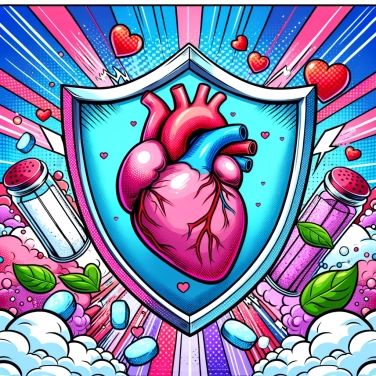It is essential to limit salt intake to prevent cardiovascular diseases because high salt consumption is associated with high blood pressure, a major risk factor for heart diseases and strokes.

When you eat too much salt, your body retains more water to maintain internal balance. This extra water increases blood volume, thereby exerting a stronger pressure on your arteries: this is what we call high blood pressure. In the long term, too much salt strains your heart, forcing it to work harder to pump all that extra blood. Gradually, your arteries become less elastic and more rigid, further increasing the risk that this higher pressure will damage your cardiovascular system. A regular excess of salt, even if it seems harmless in daily life, thus discreetly but surely promotes the development of hypertension, with all its health consequences.
Too much salt forces your body to retain more water to compensate for this excess. As a result, it increases blood volume and, consequently, blood pressure. Consistently high blood pressure fatigues your heart, which then has to work much harder. Over time, this overexertion can lead to serious problems such as heart failure, the onset of heart rhythm disorders, or even increase the risk of a stroke or a heart attack. In short, abusing salt is giving your heart troubles it would rather do without.
To easily reduce your salt intake, limit your consumption of processed foods, such as prepared meals, cold cuts, or snack biscuits: they are loaded with hidden salt. Change your habits by favoring fresh or homemade products, where you control the amounts yourself. Replace salt with spices or herbs to enhance your dishes without feeling frustrated. Also, remember to check the nutritional labels: a product containing more than 1.5 g of salt per 100 g is already too salty. At the table, avoid having the salt shaker always within reach, which will prevent you from automatically adding more.
Reducing your salt intake is a small change that yields significant benefits for heart health. It significantly lowers the risk of high blood pressure, which is good for the entire cardiovascular system. Less salt also reduces the risks of strokes, heart attacks, and overall, it better protects your heart and arteries. You get tired less quickly, have more energy in your daily life, and it even helps keep your heart healthy for longer. A simple brake on the salt shaker today is a true winning strategy for your cardiovascular system in the long term.
Sodium, the main component of salt, is essential for nerve transmission and the water balance in our body. However, the daily intake recommended by the WHO is limited to 5 grams (approximately one teaspoon), a quantity that is often exceeded by the majority of the population.
Potassium, found especially in fruits and vegetables, helps the body eliminate excess sodium. Increasing your intake of green vegetables, bananas, or lentils can thus contribute to better heart health.
Some common medications, such as non-steroidal anti-inflammatory drugs (ibuprofen, aspirin), when taken frequently, can enhance the harmful effects of salt on blood pressure.
The taste of salt is partly a cultural habit: after a few weeks of a reduced-salt diet, the taste buds gradually adapt, and foods naturally seem more flavorful without the need to add more salt.
It is preferable to gradually reduce salt intake rather than eliminating it abruptly and suddenly. A too-rapid decrease can lead to a loss of appetite, a decrease in food enjoyment, or, very rarely, sodium balance disorders (hyponatremia). Ideally, adaptation should occur progressively over a few weeks.
Yes, even if you don't have high blood pressure, limiting your salt intake can protect your cardiovascular system in the long term. Excessive reduction of salt helps preserve artery health, reduces the risk of future hypertension, and prevents heart and vascular diseases.
According to the World Health Organization (WHO), it is recommended to limit daily salt intake to a maximum of 5 grams (about one teaspoon). This corresponds to about 2 grams of sodium per day, which helps prevent the risks of hypertension and associated cardiovascular diseases.
To enhance your dishes without sugar or excessive salt, focus on using aromatic herbs (such as thyme, rosemary, basil), spices (like paprika, cumin, turmeric), garlic, onions, or citrus juices. These alternatives will add flavor and variety while preserving your cardiovascular health.
Processed foods, ready-made meals, charcuterie, and canned goods, as well as certain industrial breads and cookies, often contain a high amount of salt without necessarily tasting particularly salty. Getting into the habit of reading nutritional labels allows you to better manage your sodium intake.

No one has answered this quiz yet, be the first!' :-)
Question 1/4